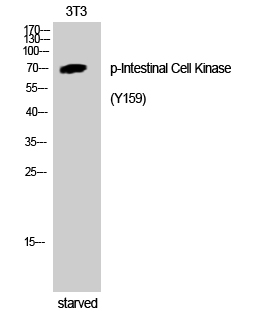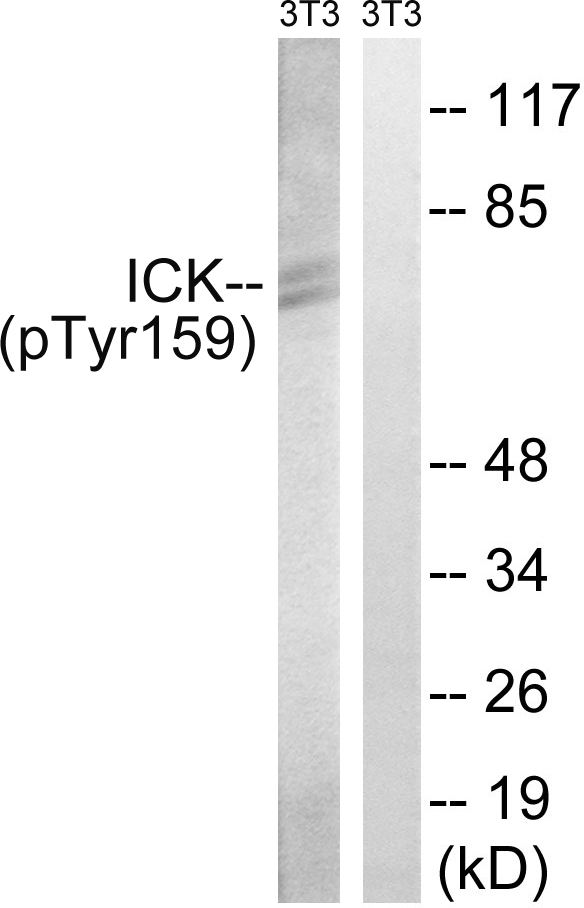Product Name :
ICK(Phospho-Tyr159)polyclonal antibody Background :
intestinal cell kinase(ICK) Homo sapiens Eukaryotic protein kinases are enzymes that belong to a very extensive family of proteins which share a conserved catalytic core common with both serine/threonine and tyrosine protein kinases. This gene encodes an intestinal serine/threonine kinase harboring a dual phosphorylation site found in mitogen-activating protein (MAP) kinases. The protein localizes to the intestinal crypt region and is thought to be important in intestinal epithelial cell proliferation and differentiation. Alternative splicing has been observed at this locus and two variants, encoding the same isoform, have been identified. [provided by RefSeq, Jul 2008], Product :
Liquid in PBS containing 50% glycerol, 0.5% BSA and 0.02% sodium azide. Storage&Stability :
Store at 4°C short term. Aliquot and store at -20°C long term. Avoid freeze-thaw cycles. Specificity :
Phospho-Intestinal Cell Kinase (Y159) Polyclonal Antibody detects endogenous levels of Intestinal Cell Kinase protein only when phosphorylated at Y159. Immunogen :
The antiserum was produced against synthesized peptide derived from human ICK around the phosphorylation site of Tyr159. AA range:125-174 Conjugate :
Unconjugated Modification :
Phosphorylation
ICK(Phospho-Tyr159)polyclonal antibody Background :
intestinal cell kinase(ICK) Homo sapiens Eukaryotic protein kinases are enzymes that belong to a very extensive family of proteins which share a conserved catalytic core common with both serine/threonine and tyrosine protein kinases. This gene encodes an intestinal serine/threonine kinase harboring a dual phosphorylation site found in mitogen-activating protein (MAP) kinases. The protein localizes to the intestinal crypt region and is thought to be important in intestinal epithelial cell proliferation and differentiation. Alternative splicing has been observed at this locus and two variants, encoding the same isoform, have been identified. [provided by RefSeq, Jul 2008], Product :
Liquid in PBS containing 50% glycerol, 0.5% BSA and 0.02% sodium azide. Storage&Stability :
Store at 4°C short term. Aliquot and store at -20°C long term. Avoid freeze-thaw cycles. Specificity :
Phospho-Intestinal Cell Kinase (Y159) Polyclonal Antibody detects endogenous levels of Intestinal Cell Kinase protein only when phosphorylated at Y159. Immunogen :
The antiserum was produced against synthesized peptide derived from human ICK around the phosphorylation site of Tyr159. AA range:125-174 Conjugate :
Unconjugated Modification :
Phosphorylation
-
 Western Blot analysis of 3T3 cells using Phospho-Intestinal Cell Kinase (Y159) Polyclonal Antibody
Western Blot analysis of 3T3 cells using Phospho-Intestinal Cell Kinase (Y159) Polyclonal Antibody -
 Western blot analysis of lysates from NIH/3T3 cells treated with starved 24h, using ICK (Phospho-Tyr159) Antibody. The lane on the right is blocked with the phospho peptide.
Western blot analysis of lysates from NIH/3T3 cells treated with starved 24h, using ICK (Phospho-Tyr159) Antibody. The lane on the right is blocked with the phospho peptide.
Bioworld Biotech only provide peptides for our antibodies and do not provide additional peptide customization services.
Price/Size :
USD 368/1mg/vial
Tips:
For phospho antibody, we provide phospho peptide(0.5mg) and non-phospho peptide(0.5mg).Describe :
Blocking peptides are peptides that bind specifically to the target antibody and block antibody binding. These peptide usually contains the epitope recognized by the antibody. Antibodies bound to the blocking peptide no longer bind to the epitope on the target protein. This mechanism is useful when non-specific binding is an issue, for example, in Western blotting (WB) and Immunohistochemistry (IHC). By comparing the staining from the blocked antibody versus the antibody alone, one can see which staining is specific; Specific binding will be absent from the western blot or IHC performed with the neutralized antibody.Formula:
Synthetic peptide was lyophilized with 100% acetonitrile and is supplied as a powder. Reconstitute with 0.1 ml DI water for a final concentration of 10 mg/ml.The purity is >90%,tested by HPLC and MS.
Storage:
The freeze-dried powder is more stable. For short time at 2-8°C. For long term storage store at -20°C.
Note :
This product is for research use only (RUO only). Not for use in diagnostic or therapeutic procedures.
 ICK(Phospho-Tyr159)polyclonal antibody
ICK(Phospho-Tyr159)polyclonal antibody  Datasheet
Datasheet COA
COA MSDS
MSDS SHIP
SHIP